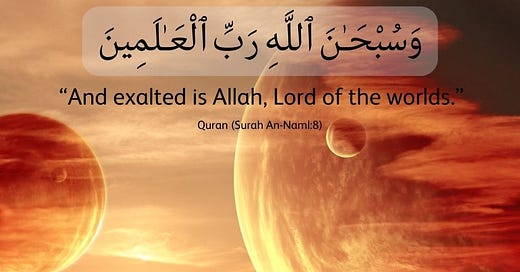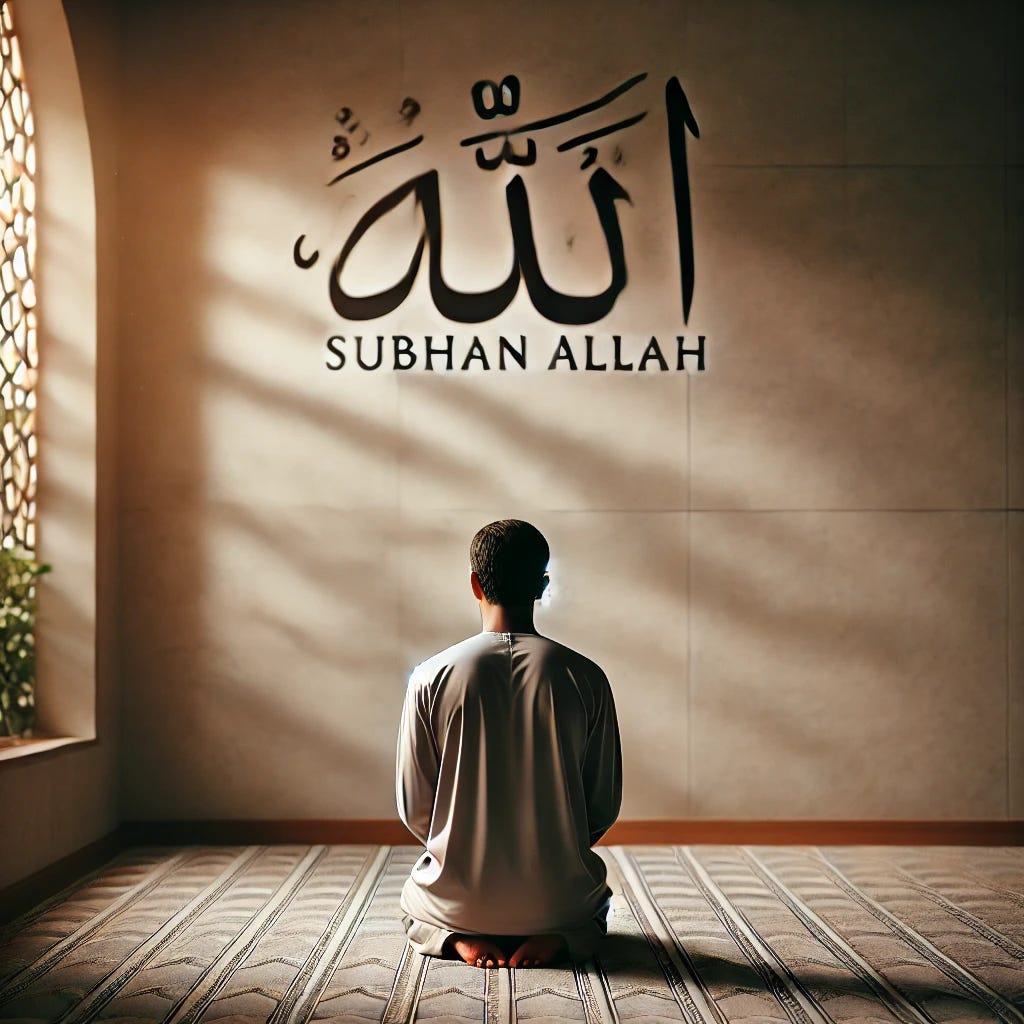'SubhanAllah' (It's Power and Majesty)
The Meaning and Magnitude of SubhanAllah - The Ultimate Glorification of the Lord
Among the most powerful utterances a believer can make is SubhanAllah (Exalted is Allah). These words are not mere syllables but an expression of the highest glorification of the Almighty. They transcend human limitations in praising the Creator, declaring His absolute perfection, and affirming His transcendence over all deficiencies.
The command to glorify Allah by saying SubhanAllah is deeply rooted in the very foundation of Tawheed. It is an acknowledgment that Allah is above all imperfections, beyond any flaws, and free from all false ascriptions. It is the voice of the heart proclaiming the infinite majesty of the One who has no equal.
Shaykh al-Islam Ibn Taymiyyah (may Allah have mercy on him) eloquently captured the essence of this profound glorification when he said:
“The command to glorify Him (by saying SubhanAllah) also implies declaring Him to be above every fault and shortcoming, and affirming the attributes of perfection for Him. Tasbeeh implies declaring Him to be above any fault and venerating Him, and veneration implies affirming praiseworthy attributes for which He is praised, and that implies declaring Him to be above any faults, praising Him, magnifying Him and affirming His Oneness.”
This declaration is not simply about negation but about the highest affirmation. To say SubhanAllah is to witness with the heart that Allah is free from every limitation of creation. It is to recognize that He is beyond all imperfection, and that He alone possesses every quality of perfection and grandeur.
The Superior Formula: Multiplying the Praise
While saying SubhanAllah alone is mighty, Prophet Muhammad (sallallahu alaihi wasallam) taught us an even greater way to magnify Allah’s glory. A formula that elevates the weight of dhikr beyond human imagination:
SubhaanAllaah wa bi hamdih, ‘adada khalqihi, wa ridaa nafsihi, wazinata ‘arshihi, wa midaada kalimaatihi.
(Glory and praise be to Allah, as much as the number of His creation, as much as pleases Him, as much as the weight of His Throne, and as much as the ink of His words.)
Ibn al-Qayyim (may Allah have mercy on him) described this form of remembrance as being many times superior to merely saying SubhanAllah. He explained:
“What the one who says ‘SubhaanAllaah wa bi hamdih, ‘adada khalqihi…’ achieves of knowing Allah, exalting Him and glorifying Him, when his dhikr is connected to the huge numbers mentioned, is far greater than what is achieved by the one who merely says SubhanAllah. This is called multiplied dhikr and it is greater glorification and praise than regular dhikr, hence it is better than it.”
This multiplied glorification increases not just the reward of the believer but also deepens the awareness of Allah’s infinite greatness. It links the mind and soul to the vastness of His creation, the unfathomable weight of His Throne, and the limitless expanse of His divine words.
The Quranic Language of Glorification
The Quran itself resonates with the echoes of tasbeeh. The divine revelation calls upon the believers to glorify their Lord in numerous ways, often using expressions of absolute transcendence. One of the powerful forms is sabbaha, which appears in different contexts:
“Whatever is in the heavens and whatever is on the earth exalts Allah, and He is the Exalted in Might, the Wise.” (Surah Al-Hashr 59:1)
This verse reveals that tasbeeh is not just the action of human tongues, but a cosmic reality. Everything in existence - the stars, the oceans, the mountains, and even the smallest of creatures - proclaims the perfection of its Creator.
The Quran also uses subhana alladhi to emphasize the limitless power and glory of Allah:
“Exalted is He who took His Servant by night from al-Masjid al-Haram to al-Masjid al-Aqsa, whose surroundings We have blessed, to show him of Our signs. Indeed, He is the Hearing, the Seeing.” (Surah Al-Isra 17:1)
Here, subhana is used to introduce an event of extraordinary divine power - the Night Journey of Prophet Muhammad (sallallahu alaihi wasallam). This underscores that SubhanAllah is not just about verbal praise but about affirming Allah’s supreme authority over all things, seen and unseen.
Why This Glorification is So Important
To say SubhanAllah is to cultivate a heart that is ever-conscious of Allah’s greatness. It instills humility, for it reminds the believer that all creation is limited, but Allah is beyond limits. It nurtures love for the Creator, as it reinforces His absolute perfection. It is a shield against heedlessness, bringing the soul into alignment with the worship of all creation.
Prophet Muhammad (sallallahu alaihi wasallam) emphasized its weight on the scale of deeds:
“Two words are light on the tongue, heavy in the balance, and beloved to the Most Merciful: SubhanAllah wa bihamdihi, SubhanAllah al-Azeem.” (Sahih Bukhari and Muslim)
This is not just an encouragement but a divine secret. The simple utterance of these words carries weight beyond human comprehension. It is a means of drawing near to Allah, of purifying the soul, and of aligning oneself with the rhythm of creation’s ceaseless glorification.
The Eternal Echo of SubhanAllah
When a believer says SubhanAllah, they are joining in the chorus of celestial praise that has never ceased. The angels glorify Him. The Prophets glorified Him. The righteous before us glorified Him. The heavens and the earth glorify Him.
It is a word that will never diminish in power, for it is tied to the eternal truth that Allah alone is perfect, without flaw, without weakness, without equal.
To utter SubhanAllah is to place oneself in harmony with the reality of existence. To repeat it with understanding is to taste the essence of faith. To believe in it wholeheartedly is to walk the path of those nearest to Allah.
Conclusion: Elevate Your Heart with SubhanAllah
Every SubhanAllah is a step towards Allah. Every utterance is a moment of elevation. It is not just a dhikr - it is a key to unlocking the realization of divine majesty.
The most blessed souls are those whose tongues are moistened with this remembrance. The most enlightened hearts are those that know what it means. The most honored in the sight of Allah are those who declare His absolute perfection with full awareness of His magnificence.
So let the heart proclaim it. Let the soul rise with it. Let the tongue be ever engaged in it.
SubhanAllah. SubhanAllah wa bihamdihi. SubhanAllah al-Azeem.
Nearness (Qurab) to Allah
This article is based on the book - Ibn Taymiyyah Expounds on Islam and explains the concept of Nearness to Allah (Qurb) as explained and clarified by Ibn Taymiyyah. His discussion on this topic is deeply rooted in Quranic verses and prophetic traditions, providing a clear understanding of what it means for man to draw close to Allah and how Allah respo…










SUBHAANALLAAH!